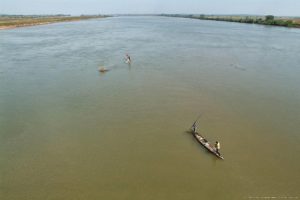The Nigeria Hydrological Services Agency (NIHSA) on Friday, September 27, 2024, urged Nigerians to take flood warnings seriously, as the country faces rising water levels due to flash and river flooding.

In a statement, the Director-General Umar Mohammed, said the warning comes in response to prolonged rainfall across the nation.
This, he said, had caused devastating flash floods in several areas.
Mohammed stressed the importance of maintaining clear drainage systems and ensuring that water runoff paths are unobstructed.
He urged citizens to clear their gutters and drainages to help mitigate the impact of flooding.
“NIHSA remains committed to monitoring the water levels of major rivers and tributaries across the country, issuing timely flood warnings and predictions,” the statement read.
The director-general also revealed NIHSA’s collaboration with emergency response agencies and the media to save lives and protect property, noting the need for a collective effort to reduce the effects of floods.
Mohammed confirmed that water levels in the Rivers Niger and Benue have reached critical levels, raising concerns about potential severe flooding in communities along these riverbanks.
He advised residents in affected areas to relocate to safer locations and take steps to secure their lives and property.
He further noted that the agency is working to enhance food security, promote national resilience, and ensure sustainable water resource management as the country braces for continued rainfall in the coming weeks.
According to him, NIHSA remains committed to providing regular updates and flood alerts to keep the public informed of the situation.
NIHSA’s 2024 Annual Flood Outlook reveals that 148 Local Government Areas (LGAs) across 31 states are at high risk of flooding.
The affected states include Adamawa, Akwa-Ibom, Anambra, Bauchi, Bayelsa, Benue, Borno, Cross River, Delta, Ebonyi, Edo, Imo, Jigawa, Kaduna, Kano, Katsina and Kebbi.
Others are Kogi, Kwara, Lagos, Nasarawa, Niger, Ogun, Ondo, Osun, Oyo, Plateau, Rivers, Sokoto, Taraba, and Yobe.
By Tosin Kolade
